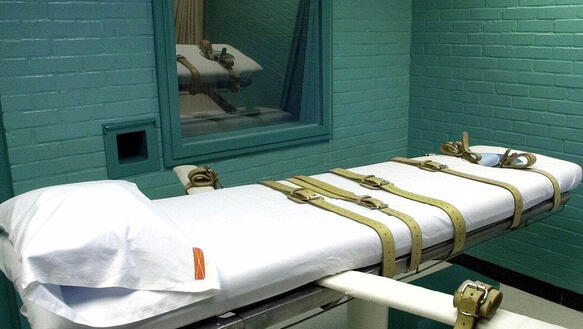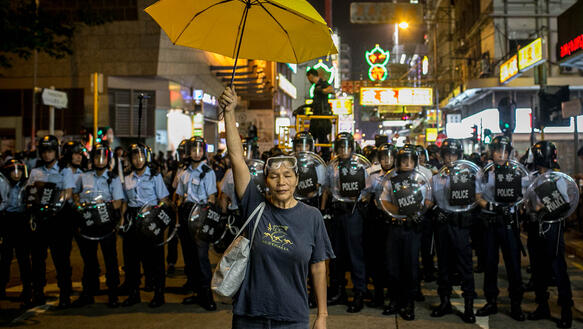DEINE SPENDE KANN LEBEN RETTEN!
Mit Amnesty kannst du dort helfen, wo es am dringendsten nötig ist.
DEINE SPENDE WIRKT!
USA/Texas: Hinrichtung stoppen!
Diese Urgent Action ist beendet.
Ivan Cantu ist am 28. Februar 2024 im US-Bundesstaat Texas hingerichtet worden. Er wurde 2001 eines Doppelmordes für schuldig befunden, den er im November 2000 begangen haben soll, und zum Tode verurteilt. Eine unabhängige Untersuchung hatte Zweifel an der Fairness seines Verfahrens aufgeworfen. Die in letzter Instanz eingelegten Rechtsmittel waren abgelehnt und eine Begnadigung ausgeschlossen worden.

Hinrichtungskammer in Huntsville im US-Bundesstaat Texas (Archivaufnahme)
© AP GraphicsBank
Ivan Cantu soll am 28. Februar 2024 im US-Bundesstaat Texas hingerichtet werden. Er wurde 2001 eines Doppelmordes für schuldig befunden, den er im November 2000 begangen haben soll, und zum Tode verurteilt. Eine neuere unabhängige Untersuchung hat Fragen über die Angemessenheit seiner rechtlichen Vertretung im Prozess aufgeworfen. Außerdem weckt sie Zweifel an der Aussage der Hauptzeugin der Staatsanwaltschaft. Auch die Sachbeweise, die diese Aussage im Verfahren bestätigen sollten, scheinen nicht belastbar zu sein. UN-Schutzmechanismen für zum Tode verurteilte Personen schreiben vor, dass die Todesstrafe nur dann verhängt werden darf, wenn die Schuld der angeklagten Person in eindeutiger und überzeugender Weise, die keine andere Erklärung des Sachverhalts zulässt, nachgewiesen wurde.
Appell an
Texas Board of Pardons and Paroles
P.O. Box 13401
Austin, Texas 78711-3401
USA
Sende eine Kopie an
Botschaft der Vereinigten Staaten von Amerika
I. E. Frau Amy Gutmann
Clayallee 170
14195 Berlin
Fax: 030-83 05 10 50
E-Mail: feedback@usembassy.de
Amnesty fordert:
- Was 2001 noch nach einem Urteil aussah, das aufgrund belastbarer Beweise gefällt worden war, ist nun in Zweifel gezogen worden. Bitte empfehlen Sie dem Gouverneur, das Todesurteil von Ivan Cantu umzuwandeln.
Sachlage
Ivan Cantu befindet sich seit über zwei Jahrzehnten im Todestrakt. Er wurde weder im ursprünglichen Prozess noch im Berufungsverfahren wirksam vertreten. Der 50-Jährige Latino hat stets seine Unschuld an den beiden Morden beteuert, für die er zum Tode verurteilt wurde.
In einer vierjährigen unabhängigen Untersuchung konnten nun neue Beweise aufgedeckt werden, die den Geschworenen im ersten Prozess nicht bekannt waren. Dies verstärkt die Bedenken hinsichtlich der Effizienz des Rechtsbeistands von Ivan Cantu während des Verfahrens und lässt Zweifel an der Zuverlässigkeit seiner Verurteilung aufkommen. Nachdem zwei der Geschworenen die neuen Beweise gesehen hatten, unterzeichneten sie 2023 eidesstattliche Erklärungen, in denen sie ihre Besorgnis über die Situation zum Ausdruck brachten. Sie äußerten den Wunsch, dass ein Gericht die neuen Beweise prüfen möge. In einer der Stellungnahmen hieß es: "Die Aussage der Hauptzeugin [war] in zentralen Punkten falsch oder irreführend, was mich dazu veranlasst, den Wahrheitsgehalt ihrer Aussage insgesamt in Frage zu stellen". Und in der zweiten: "Ich war bestürzt, als ich erfuhr, dass die Untersuchung viele der Aussagen und Beweise, auf die ich und die anderen Geschworenen sich zum Zeitpunkt des Prozesses verließen, in Zweifel gezogen hat. Nun bin ich besorgt, dass der Staat einen Mann aufgrund meines Urteils zu Unrecht hinrichten lässt".
Letztes Jahr wurde der 26. April 2023 als Hinrichtungstermin festgelegt. Doch die Rechtsbeistände von Ivan Cantu legten am 18. April 2023 erneut ein Rechtsmittel ein, woraufhin am nächsten Tag ein Richter in Collin County anordnete, den Hinrichtungstermin zurückzuziehen. Im August 2023 erließ das Berufungsgericht für Strafsachen im Bundesstaat Texas (Court of Criminal Appeals, TCCA) jedoch einen Beschluss, in dem es hieß, dass die Rechtsbeistände nicht befugt seien, ein neues Rechtsmittel zur Prüfung der Rechtmäßigkeit des Todesurteils einzulegen. In der Begründung hieß es, dass die hohen Anforderungen des texanischen Rechts für eine solche Prüfung nicht erfüllt seien. Das Gericht hatte bei seiner Entscheidung jedoch nicht geprüft, ob die neu entdeckten Beweise die Begründung für ein neues Rechtsmittel rechtfertigen.
Ohne eine gerichtliche Prüfung dieser neuen Beweise bleibt die Begnadigung durch den Gouverneur der einzige Weg, die Hinrichtung zu stoppen.
Hintergrundinformation
Ivan Cantu was sentenced to death in October 2001 for the murders of his cousin JM and JM’s fiancée AK in their home in North Dallas, Texas in November 2000. His conviction was based principally on the testimony of AB, his fiancée at the time of the murders, coupled with physical evidence that appeared to corroborate her testimony. Indeed, the prosecution told the jury that "you can convict him based on her testimony alone" and in upholding the conviction in 2004, the TCCA said that her "testimony about the offense wholly incriminated [Cantu] in the murders and robbery". On cross-examination, a detective testified that during the investigation, police had received an anonymous tip that JM, who dealt drugs in large quantities, owed a rival drug dealer a substantial amount of money at the time of his death. The police investigation, however, had quickly became focussed on Ivan Cantu.
In preparation for trial, Ivan Cantu’s court-appointed lawyers did not request the appointment of an investigator, leaving them reliant on examining witnesses and evidence provided by the prosecution. Neither did they seek the assistance of a DNA expert, a ballistics expert, a fingerprint examiner, a blood-spatter expert, or a medical examiner, as the prosecution did. For state habeas corpus review, Ivan Cantu was appointed a lawyer who never met with him to discuss the case, and filed an appeal without discussing it with him, challenging the death sentence but not the conviction. The lawyer raised a single claim of ineffective assistance of counsel (IAC) at the sentencing. The federal courts have therefore not reviewed the question of IAC in the first phase because it has not been reviewed by the state courts. International standards require that anyone facing the death penalty be provided "adequate legal assistance at all stages of the proceedings", "above and beyond the protections afforded in non-capital cases".
AB testified that in the late evening of 3 November 2000, Ivan Cantu told her he was going to kill JM and AK and came back an hour later with blood on his jeans. She said that she put his jeans and socks into the kitchen waste bin, and that the couple later went to the crime scene to look for drugs and money but found none. They left home around midday on 4 November on a preplanned trip to visit AB’s mother and stepfather in Arkansas, before driving back on 7 November. The bodies of the two victims were discovered on the afternoon of 4 November. Both had been shot. The jeans and socks were found in the kitchen bin during a search of Ivan Cantu’s apartment on 7 November, and DNA testing showed the blood was from the victims. On 8 November, after Ivan Cantu was arrested, AB called her stepfather, stating, "I'm scared to death they are going to kill me. Get me out of here." She flew back to Arkansas that day, gave statements to the authorities implicating Ivan Cantu and agreed to testify against him.
An investigation by a private investigator over the past four years has called into doubt AB’s testimony, including:
- Shortly after the bodies were discovered on 4 November, police went to Ivan Cantu's apartment. One of the officers has since stated that the jeans and socks were not in the kitchen bin at that time, and she was "positive" that the "thorough search" would have revealed them if they had been. At the trial, telephone records admitted into evidence showed that a long-distance call was made from Ivan Cantu's apartment that evening after the police search, and by which time he and AB were hundreds of miles away in Arkansas. The jeans recovered from the bin, which AB testified were Ivan Cantu's, were men's size 34/32. Ivan Cantu wore size 30/30.
- AB testified that on the night of the murders she saw Ivan Cantu wear JM's Rolex watch and later dispose of it. It was revealed in 2019 that AK’s brother had taken the watch at the crime scene and given it to the police, who had returned it to JM’s mother not long afterwards.
- AB testified that, on the night of the crime, Ivan Cantu asked her to marry him and gave her a diamond engagement ring that she later learned he had taken from AK's body. She said that he took the ring back and discarded it on the return to Dallas. It has never been found. Witnesses have since said that the couple had announced their engagement, and that AB was wearing an engagement ring, a week before the murders.
- AB testified that Ivan Cantu disposed of a pair of her boots she had worn to the crime scene in case they could be linked to the crime, but the boots were recovered from Ivan Cantu’s car after his arrest.
- AB testified that the murders occurred between about 11:30pm and midnight on 3 November. Two forensic pathologists have now concluded that the murders were likely to have occurred the following morning. Police reports kept from the jury state that a man who had been living with JM and AK for weeks before the murders said after their bodies were found on 4 November, "They weren't killed last night, they were killed today."
- AB’s brother testified that before the crime, Ivan Cantu had told him he planned to kill JM and had sought to recruit him to "clean up" after it. He recanted his testimony in 2022, saying he was not a credible witness due to his drug abuse, had been on drugs when he testified, and that the conversation with Ivan Cantu had "never happened". Only he and AB testified that Ivan Cantu owned a gun and identified the murder weapon as his.
International safeguards state that "Capital punishment may be imposed only when the guilt of the person charged is based upon clear and convincing evidence leaving no room for an alternative explanation of the facts." The UN Human Rights Committee, established under the International Covenant on Civil and Political Rights (which the USA ratified in 1992) to oversee compliance with that treaty, has said that "States parties must… take all feasible measures in order to avoid wrongful convictions in death penalty cases". There have been 1,583 executions in the USA since 1976, 586 of them in Texas. Amnesty International opposes the death penalty unconditionally.
